You are here:
PacLII >>
Databases >> Tokelau
Judicial Annual Reports >> 2012 - 2013 Annual Report
2012 - 2013 Annual Report
TOKELAU
JUDICIAL ANNUAL REPORT
FOR LAW AND JUSTICE AGENCIES
2012/2013

Download PDF version - English
Download PDF version - Tokelauan
For further information contact:
Office of the Council for the Ongoing
Government of Tokelau
1st Floor SNPF Plaza / P O Box 3298, Apia,
Samoa
Phone +685 20822, website http://TokelauNSO.tk
Legal Adviser: Lise Suveinakama
Contents
Preface by the Chief Justice of Tokelau
Preface by the Ulu (Titular Head) of
Tokelau
Forewords by the three Komehina Tulafono
(Law Commissioners) of Tokelau
1. Atafu
2. Fakaofo
3. Nukunonu
1. Organisational Review
1.1 Overview of the Tokelau Court System
and Police and their Jurisdiction/Role and Functions
1.1.1 Constitutional Framework of Tokelau
1.1.2 The Government of Tokelau
1.1.3 Courts System
1.1.4 Tokelau Police
1.2 Tokelau National Strategic Plan
2010-15: Justice Sector Guiding Principles
1.3 Justice Sector Guiding Principles
1.4 Organisational Structure
2. Improving Access to Justice
2.1 Nukunonu
3. Enhancing Community Safety
3.1 Atafu
3.2 Fakaofo
3.3 Nukunonu
4. Improving Information and Human Resource
Management in the Law and Justice Sector
4.1 Courts Results
4.1.1 Atafu
4.1.2 Fakaofo
4.1.3 Nukunonu
4.2 Police Results 2012/13
4.2.1 Atafu
4.2.2 Fakaofo
4.3 Police Workload
4.4 Courts Human Resources
4.4.1 Atafu
4.4.2 Fakaofo
4.4.3 Nukunonu
4.4.4 Village Appeal Committees
4.5 Police Human Resources
4.5.1 Atafu
4.5.2 Fakaofo
4.5.3 Nukunonu
5. Instituting Principles of Good
Governance and Enhancing Integrity in the Institutions of Law and Justice
5.1 Tokelau Public Service Code of Conduct
5.2 Judicial Code of Conduct
5.3 Complaint-Handling Mechanism for
Tokelau Judiciary and Police
5.4 Management Accountability
5.4.1 Annual Accounts for Reporting Period
5.5 Training and Development Opportunities
for Court Staff and Police
5.6 Management of Courts and Police
Infrastructure
5.6.1 Court Houses
5.6.2 Police Offices
5.7 Improving National Border Management
Appendix: Summary of Expenditure for Police
& Judiciary for the Period 1 July 2012 to 30 June 2013 (NZ$)
Preface by the Chief Justice of Tokelau
It has been a real pleasure to receive this
excellent report of how the rule of law has been observed in Tokelau in the
2012/13 financial year. Tokelau’s first report was a considerable achievement.
But in some ways a second report is even more important because it demonstrates
commitment to annual accounting to the people of Tokelau for the working of the
justice system. A system of justice that is not open is a contradiction in
terms. Laying out how judicial services are provided in the three villages of
Tokelau is necessary if people are to be assured that they live under the
security of law. It allows the performance of the system to be understood and
measured, so that it is fit for the needs of the people.
The 2012/13 report is something to be proud
of. Those who produced it are to be congratulated. It is practical help to all
who are engaged in providing legal services. And it allows the people of
Tokelau to know what is being done, and especially the good work that is being
done by the Law Commissioners, Court Clerks, and the Police. It also allows us
to consider what improvements should be made – and all legal systems need
constant improvement if they are to be fit for purpose and keep the confidence
of the people they serve.
At a recent meeting of the Chief Justices
of the Pacific I, learned of the steps that have been taken and are to be taken
later in 2014 to assist with capacity building in the judicial system in
Tokelau under the Pacific Judicial Development Programme. I expect that these
initiatives will be the subject of reporting in the next annual report. And I
was delighted to see that, in a comparative survey of the judicial systems in
the Pacific Region, Tokelau is performing well against many of the measures
against which other jurisdictions are measuring their delivery of judicial
services.
I express my admiration for the work of all
those who assist in the administration of justice in Tokelau, especially the
Law Commissioners Ioane Tumua, Penehe Tulafono, and Fereti Lopa; the Court
Clerks; the Police; and the Judicial National Coordinator and Legal Advisers
Lise Suveinakama and Professor Tony Angelo. In turn, they could not do their
work without the support of the Ulu o Tokelau, the Taupulega, the Government of
Tokelau, and the people of Tokelau.
A properly working system of justice is the
work of many hands. And it needs to be nourished by the support of the people
and their expectations of a just society. This report is a way to acknowledge
that support and those expectations.
Rt Hon Dame Sian Elias
Chief Justice of
Tokelau
18 March 2014
Preface
by the Ulu (Titular Head) of Tokelau
It is with great pleasure that I submit
Tokelau’s Second Annual Judicial Report for the 2012/13 Financial Year. This
Second Annual Judicial Report reports on the work of our judiciary and the
overall management of judicial services in the three villages of Tokelau. The
report also includes information about the courts in Tokelau, their
composition, jurisdiction and workload for 2012/13.
As the Ulu o Tokelau for 2013, I am pleased
to contribute to this annual report. I must congratulate our Judicial Officers
namely our Law Commissioners, Court Clerks and Police for their hard work and
continuous effort to inform the public, court users and also the international
community on their judicial performance. This report aims to reflect the vision
outlined in the National Strategic Plan of Tokelau "Healthy and Active
Communities with Opportunities for All". Through this report, it is my
hope that our judicial services strive to adhere to the good governance
principles, so that our judicial system and processes are not only responsive
in a timely manner but more importantly are transparent and accountable. This I
believe enables our judiciaries to stay on the right path in order to
satisfactorily achieve our vision of healthy and active communities who trust
and have confidence in our judicial systems.
I am excited and very appreciative to see
the great work of our Law Commissioners, Court Clerks and Police in
implementing judicial services for our people. It is important that our
judicial systems and processes continue to deliver quality services. I must
acknowledge and thank the Taupulega (Village Councils) and the Government of
Tokelau and other agencies, especially the Pacific Judicial Development
Programme for their support through financial and technical assistance which
have helped build and strengthen the capacity and abilities of our Judicial
Officers. This support I believe has contributed immensely to effective and
efficient judicial services.
I aspire to see Tokelau's judiciary
continue to evolve and deliver a quality justice that is fair, accessible and
responsive in a timely manner to our people's judicial needs whatever their
gender, colour, race, religion, age or whether they live with a disability.
Once again "well done and a big
congratulations" to our Judicial Officers for their hard work that ensures
our people and Tokelau continue to know your services and your goals. This will
lead to our people living happily and in safe communities now and in the years
to come.
Fakafetai,
Faipule Kuresa Nasau
Ulu o
Tokelau, 2014
Forewords
by the three Komehina Tulafono (Law Commissioners) of Tokelau
1. Atafu
Tulou o Paia o Ha ma o Tapu
Fakaofo, Nukunonu, Atafu ma Olohega
Greetings,
We acknowledge and thank our Taupulega for
their commitment and patience and continuous efforts to ensure Tokelau and her
people are living happily and in harmony.
It is a fact that this year has been a
fruitful one, thanks to the efforts and hard work of the Council for the
Ongoing Government of Tokelau. Our network and partnerships with other regional
bodies and, more importantly, with New Zealand operates to implement the wishes
and aspirations of the people of Tokelau and the Village. I want to especially
thank the Ulu o Tokelau, all Ministers, and General Fono delegates, for your
part in making sure the decisions you make are the most efficient and they meet
the wishes and the needs of the Taupulega and our people.
Thank you to the Taupulega of Atafu for
your wise governance and not feeling tired of doing your tasks. Thank you for
your patience and leadership and especially to deal with the constant
challenges we face.
Thank you to the men's group as the
strength of the village, the women's group, and the village public service and
to our youth and sport groups. Thank you for your obedience and for carrying
out the instructions and the wishes of the Taupulega - despite the challenges,
your love to serve supersedes.
We have completed our work for 2012/13, the
work faced by our Nuku and also the work faced by the village. Let us see what
will come about in 2014 as we get some guidance from the Government. Let us
continue to pray and have faith in God.
I want to especially thank Aliki Faipule
Kelihiano Kalolo and Kuresa Nasau for also performing my roles and
responsibilities whilst I was away on medical leave in New Zealand.
I want to also thank our Legal Adviser for
her contributions and efforts to lift the quality of services in our
judiciaries in the villages. I am grateful not only for her work in Tokelau but
also her work within the region to seek funding and support to enhance the
knowledge and skills of our Judicial Officers. The Taupulega sees capacity
building as an important area that must continue.
To the National Public Service, keep up
with the ongoing training as you are the hope of the Government, to have the wisdom
and knowledge to deal with issues of the world we live in, but more importantly
the wisdom from God, to help us with the load we carry.
Thank you for paddling our canoe. Thank you
for your patience.
May the love of God take care of us as we
enter 2014 safely.
Fereti Lopa Law Commissioner, Atafu
2. Fakaofo
Malo ni! We must give thanks to our
Heavenly Father for His continuous presence amongst us always which brings
happiness, freedom and peace till today as we begin this year's service.
I acknowledge Tui o Nuku, Tui o Vavau and
the people of Tokelau.
I take this opportunity to thank the
Government of New Zealand through the Ulu o Tokelau, the General Fono for their
ongoing support in various ways: through training and also the support and
improvements on law enforcement.
I want to also thank the Taupulega of
Atafu, Nukunonu and especially the Taupulega of Fakaofo for its support to me
and the public service. I will not forget the support and prayers of the people
of Tokelau in all the three atolls, thank you for your support through your
role in enforcing the laws and abiding by the laws so that we can live in
harmony.
As we are all aware, the purpose of our
judicial system is to ensure that everyone in our community receives judicial
services that are responsive to their needs and protect them, especially if our
people are faced with domestic violence and other types of abuse being
committed against them. Our priority is the safety of our people and that they
too have faith in our judicial system, and more importantly they have faith in
us who are carrying out the judicial services for them. This makes it very
important for us to work together and share the challenges and discuss ways and
solutions to improve those challenges, especially to ensure that we provide
judicial services in a timely manner and that our people are happy and have
faith in our system.
We hope our plans for ongoing workshops
will increase the awareness of our people in our community on the law, so they
know and understand the processes to lodge a complaint if an offence is
committed; and for the law officers to respond to people's judicial needs.
I will also use this opportunity to thank
the General Fono, the Government of New Zealand, the Government of Australia,
and the Pacific Judicial Development Programme (PJDP), the New Zealand Police,
the Council for the Ongoing Government, the Legal Advisers of Tokelau and all
those who have contributed in various roles to ensure peace and order remains
in Tokelau.
Our prayers are that Tokelau continues to
be a country that lives happily and her people are living peacefully and in
harmony in the love of God.
"Tokelau lives on"
Penehe Tulafono Law Commissioner of Fakaofo
3. Nukunonu
"Nukunonu is to be congratulated for caring
for her children"
Her customs and traditions are the
foundation. This will certainly contribute to people living happily and safely.
Be faithful to your customs and traditions.
Ears must listen; treasure in your hearts your customs and traditions, take
them and use them as you live life.
The continuous changing of the climate,
will surely drown our small islands; but similarly, behaviour and attitudes can
also drown Nukunonu and our true Tokelauan way. My heart aches.
I must acknowledge and thank the Government
of New Zealand, Government of Australia, Government of Tokelau; not forgetting
the Pacific Judicial Development Programme (PJDP), the New Zealand Police, and
the Council for the Ongoing Government of Tokelau, the Legal Advisers of
Tokelau and all those who are responsible for keeping Tokelau safe and
peaceful.
We should not be hesitant or shy to
request, that we need your continuous support to strengthen the capacity and
abilities of our Judicial Officers. It is also important that we have the
appropriate tools and resources to enable the delivery of judicial services.
- There are so many challenges at present
and these have become barriers in terms of delivering quality and efficient
justice in Nukunonu. The reasons are as follows:There is insufficient
knowledge/skills and abilities of our judicial officers to provide safety and
peace;
- There are rules that need reviewing and
amending, thus making them more relevant and responsive to the needs of Tokelau
living in the 21st Century.
We aspire for Nukunonu (Tokelau) to be
sustainable and continue to live in harmony now and in future as conveyed in
the following chant:
Tui ni tiale ni fakatagata
Aloalo ifo hopo ki te vaka
Tui ni tiale ni fakafafine
Aloalo ifo hopo ki te puke
Lagi e mamao, lagi e mamao
E fahia kita I he gaogao
Lagi e mamao, lagi e mamao
E fahia kita, tui ni tiale
He
hoa, he hoa lava!
The man puts on flowers
Comes to the canoe
The woman puts on flowers
Comes to the bow covers of the canoe
The sky is too far, the sky is too far
Bound me in the empty space
The sky is too far, the sky is too far
Bound me with flowers
A
partner, of course, needs a partner.
Ioane Tumua
Komehina Tulafono
Fakamahinoga
a Nukunonu
1.
Organisational Review
1.1
Overview of the Tokelau Court System and Police and their Jurisdiction/Role and
Functions
1.1.1 Constitutional Framework of Tokelau
Tokelau is a non-selfgoverning territory
administered by the Government of New Zealand.
Tokelau is part of the Realm of New Zealand
(Clause 1 (d) of Letters Patent 1989). The people of Tokelau are citizens of
New Zealand.
The structure of the Government of Tokelau
is outlined in the Tokelau Act 1948. The Queen of New Zealand is the Head of
State. The Governor-General of New Zealand is the Queen's representative.
Tokelau is administered for New Zealand by
the Ministry of Foreign Affairs and Trade, and an Administrator who is the Head
of the Special Relations Unit in that Ministry.
The Parliament of New Zealand can make law
for Tokelau by Acts because Tokelau is part of New Zealand. The
Governor-General can make law for Tokelau as regulations (Section 4(1) of the
Tokelau Act 1948).
The rights and the freedom of the people of
Tokelau are contained in Rule 16 of the Constitution of Tokelau.
The main crimes in Tokelau, and the rules
of criminal procedure, are set out in the Tokelau Crimes, Procedure and Evidence
Rules.
1.1.2 The Government of Tokelau
Tokelau has two governance structures:
(i) village government
(ii) national government.
For the village government, decisions that
relate primarily to village matters are made at village level by the Taupulega
(Village Council). Village Rules are also made by the Taupulega. Disputes at
the village level are settled by the Law Commissioner and the Village Appeal
Committee (Section 10 of the Tokelau Amendment Act 1986, Rule 103 of the Crimes
Rules). Land and custom matters are settled by the Taupulega.
At the national government level, decisions
that affect the whole of Tokelau are made by the General Fono. The General Fono
may make such rules as it thinks necessary for the peace, order and good
governance of Tokelau (Section 3A of the Tokelau Act 1948). The General Fono
may not make law that contradicts an Act, regulation, or treaty that is in
force in Tokelau. The General Fono may not make law that can apply or have
effect outside Tokelau (Section 3A (4) of the Tokelau Act 1948). When the
General Fono is not in session then the Council for the Ongoing Government,
which comprises six members, makes the decisions necessary for the
administration of Tokelau.
1.1.3
Courts System
Tokelau has the following courts:
-Commissioner's Court and Village Appeal
Committee
-High Court of New Zealand (operating as
the High Court of Tokelau)
-Court of Appeal of NZ (operating as the
Court of Appeal of Tokelau).
The Chief Justice of New Zealand is also
the Chief Justice of Tokelau.
The Commissioners, who are lay judges, are
appointed by the Governor-General of New Zealand on the recommendation of the
Minister of Foreign Affairs and Trade after consultations with the Taupulega of
the relevant village. If the Commissioner is incapable by reason of sickness or
otherwise of performing the office of the Commissioner, or where there is a
vacancy in the office of the Commissioner, any person performing the functions
of the Faipule becomes the default Commissioner in the village.
Tokelau has its own first instance courts:
the Commissioner's Court and Appeal Committee of each village. In each Village
Court, there is a Commissioner and a Court Clerk. The Appeal Committee
comprises 3-4 members designated by the Taupulega, to hear any appeal on the
decisions of the Commissioner.
A Commissioner has jurisdiction only in
respect of the island to which that Commissioner is appointed and the
territorial sea of Tokelau that surrounds that island. The civil and criminal
authority of Commissioners is to hear civil claims of up to $1,000 and deal
with criminal offences punishable by a fine or up to one year's imprisonment.
The sentencing power of the Commissioners is limited to imposing a fine of up
to $150 and imprisonment of three months.
Serious matters, such as murder,
manslaughter and treason, and cases on appeal, are heard by the High Court of
New Zealand and the Court of Appeal of New Zealand, operating respectively as
the High Court of Tokelau and the Court of Appeal of Tokelau. New Zealand has
abolished the right to appeal to the Privy Council but a prerogative right of
appeal to the Sovereign continues for Tokelau. No Tokelau case has gone to
trial in these external courts.
Civil matters relating to adoption and
divorce applications, are dealt by the Council for the Ongoing Government of
Tokelau. Decisions of Council on these matters are final.
1.1.4 Tokelau Police
The operation of local police in Tokelau
can be traced back to colonial times. The Police were previously National
Police of Tokelau under the Tokelau National Public Service. The devolution of
the core national public services to village level changed the employment management
of the Police to the Taupulega of each village. The police officers are the law
enforcers and have many functions that include, but are not limited to, the
preservation of the public peace, the prevention, detection, investigation and
prosecution of offences against the laws of Tokelau and village rules. The
functions of the police officers can be exercised nationally. The Police Rules
give the Administrator the power to designate a member of the NZ Police as an
officer of the Police of Tokelau.
1.2
Tokelau National Strategic Plan 2010-15: Justice Sector Guiding Principles
The Tokelau National Strategic Plan 2012-15
presents the development aspirations of Tokelau and identifies the medium-term
development priorities for the Government of Tokelau for the period of 2012-15.
Tokelau's strategic vision calls for "Healthy and Active Communities with
Opportunities for All". The vision encapsulates the view that while the people
of Tokelau aspire to a healthy life and vibrant communities with equal opportunities
for all, it is important that any developments undertaken in Tokelau be
sustainable and lead to improving the quality of life for the people of Tokelau
without compromising their culture, heritage and environment.
There are 4 main strategic development
policy goals under the Tokelau Strategic Plan, one for each of the four policy
outcome areas of good governance, infrastructure development, human development
and sustainability. The goals are:
Goal
1: Improved governance, public sector and financial
management, and operation of the rule of law
Goal
2: Improved standard of living through adequate,
reliable and efficient infrastructure
Goal
3: Improved health and education outcomes and
social-wellbeing
Goal
4: Improved economic, cultural, environmental and
spiritual sustainability.
For the purposes of this Judicial Annual
Report, the focus is on goal 1 and specifically on the rule of law. The key
objectives under this goal clearly state:
To enhance
community safety; to improve access to justice; to institute principles of good
governance and enhance integrity in the institutions of law and justice; to
improve information and human resource management in the law and justice
sector; and to improve national border management.
The objectives for the operation of rule of
law clearly reflect the vision of the National Strategic Plan of Tokelau to
ensure that its people continue to live in healthy communities with equal
opportunities for all; hence the establishment of laws that ensure there is
peace and harmony in the communities, and a judicial system that is responsive
to everyone's needs and, more importantly, which provides equal opportunities
for all.
1.3
Justice Sector Guiding Principles
The following principles will guide the
Justice Sector of Tokelau:
- Developing and building a robust justice
sector in all the villages of Tokelau
- Supporting and building a reliable and
accessible justice system in each of the villages of Tokelau that is trusted by
the people of Tokelau
- Providing effective and quality services
to support independent justice sectors in all the villages of Tokelau
- Working closely with communities to
enhance safety and wellbeing for all.
1.4
Organisational Structure
The organisational structure of the Tokelau
judicial system is illustrated in Figure 1.

2.
Improving Access to Justice
To ensure there is a consistent and
improved access to justice in all the three judiciaries of Tokelau, it is
important to mention here that the key objective outlined under Goal 1 of the
Tokelau Strategic Plan (page 13 above) is the main focus of this judicial
report. The implementation of Goal 1 is clearly the collective responsibility
of the judiciary and the Police, because Tokelau has a small public service
with limited resources and capacities. Tokelau is unique and very different
from other jurisdictions.
While it is very clear that the role of the
Law Commissioners and the Police are distinct, there is an understanding in
Tokelau there is a need for them to work together. The Law Commissioners cannot
perform their functions effectively if the Police are not doing their work.
They are the first point of contact if an offence has been committed. The
Police are responsible for dealing with people's complaints on any offences
committed, undertaking the necessary police work and lodging the cases with the
courts. The Court Clerks will only then advise the Law Commissioner on the
cases and a date for the hearing is set. The outcome of the hearing will be
determined by the Law Commissioner based on the police reports and other
relevant information.
The establishment of the complaint box is a
joint effort by the three police departments and the judiciary of each village
to improve access to justice. This complaint box is for the court users; anyone
can put in any views they might have on the performance of the courts and the
police officers. This is an opportunity for people to have their say on the
performance of the Police in terms of their responsiveness to their complaints
and for the court officers: especially the Law Commissioners in conducting the
hearing and providing judgments and decisions on penalties and so on. It is
important for the Law Commissioners, Court Clerks and the Police to know that
they are doing their jobs efficiently and effectively; and if they are not
performing, they need to know when the needs of court users or any individual
are not being met in a timely manner. This system is still new and it may take
a while for people to actually have the confidence to use this. The Court
Clerks and the Police have reported that they have also encouraged people,
especially those who use the services, to come to see them at their office. We
hope to have some new developments on this in the next judicial annual report.
2.1
Nukunonu
The Nukunonu judiciary continues to improve
its services by informing the community on the laws and getting help when the
law is breached.
The public has been informed that those who
are attending the court hearing must be present on the day, they should not
consume alcohol, and must dress appropriately for the Court. When court users
come to Court, it is always ensured that there are adequate seating
arrangements for those waiting for the hearing.
There could be offences committed that went
unreported during the reporting period. There are situations where people are
reluctant to deal with matters when asked by the Police. Awareness workshops
with the community are important to encourage people to report matters to the
Police if they are aware of offences being committed in the villages.
The process of lodging a complaint includes
the record of information on the name of the accused, time the complaint was
made, time the Police arrived, date, venue and the nature of the charge. The
accuracy in the recording of the information on the investigations from those
involved, especially the witnesses that were presented at the scene/accidents,
is important.
Those lodging complaints must check and
make sure their statement is correct and signed by the Police and the person
making the statement.
This Annual Report is an excellent
opportunity to say " THANK YOU" to the police force of Nukunonu for your
support at all times. The support of the Taupulega, Government of Tokelau,
people of Nukunonu, Police Office in Fakaofo, Atafu is also acknowledged,
especially to the Law Commissioner for his support.
Let's not forget to say "Thank You Very
Much" to the Government of New Zealand and the NZ Police: Superintendent Ross
Arden, Sergeant Terry Gibbons ma Maualaivao Maima Koro, the Pacific Judicial
Development Programme (PJDP), Samoa Police and the opportunity for police
training.
We also acknowledge the support from the
Judicial National Coordinator and Legal Advisers of Tokelau Lise Suveinakama
and Professor Tony Angelo.
3.
Enhancing Community Safety
The Police workloads on the three atolls
are very similar as they deal with common offences that are regularly occurring
in all four villages. It is important to recognize the workload of each police
sector in relation to the number of cases they dealt with, especially enhancing
the community safety in their respective villages.
3.1
Atafu
Community policing is a topic that was
raised in our discussion with Terry Gibbons and Maima Koro. So far, we are
trying to introduce this topic into the different sectors of the community, so
that we work together in partnership to enforce the safety and provide a safer
environment with the:
-Women's Group
-Men's Group
-Youth
-Council of Chiefs
-School (Matauala).
The department tried to get involved more
in the community activities, and to help the different community groups to
understand the connection between the Police and the different village sectors.
Community safety is more likely where the Police and the community could work
together to ensure we are living in a safer environment.
Awareness workshops have been planned for
the year, on the judiciary side and also for the community to understand more
about the law.
Workshops on the importance of the White
Ribbon Day is to be held two weeks before the 25th of November. Additional work
was included in our normal duties, to help the department gain good feedback
and acknowledgement from the community.
- Visiting the old people in their houses.
- Presence at the school during their break
periods and the school year end.
- Discussions between the different
departments on their needs, especially on the side of the law.
- Establishing the school and police
partnership.
One of the highlights 2012/13 was the NZ
Police visit to Tokelau by Terry Gibbons and Maima Koro. This visit was timely
and the purpose was to assist the Police in improving services to the
communities at all times. More importantly, to ensure our communities and
people have access to police services at all times and likewise with the
courts.
During this visit from the NZ Police
department representatives, it was decided that each police department should
have a strategic plan for each financial year. These plans should be followed
so that the status of the department can be improved and recognized at the
national level. Atafu came up with a draft which has been put into action.
There was a presentation session with Terry Gibbons in preparation for an awareness
programme, and also for workshops with the communities.
This was a good discussion session, where
each person shared the things that they considered were an obstacle in
improving our services in the village and also at the national level.
Some of the department's needs were noted:
Name tags, ID cards, caps, footwear, and office resources.
3.2
Fakaofo
Ensuring there is peace and harmony in the
village of Fakaofo is very important. The Fakaofo Police have worked extremely
well with the communities and people of Fakaofo to ensure that people are fully
aware of the processes in dealing with complaints, including when cases are
heard in court. The following processes are explained to the people:
1. How to lodge a complaint with the Police
first.
2. Next the Police will investigate the
parties involved in the case and the following will occur:
- The complainant will be called in and
advised of the investigation process including taking their statements,
- Insufficient information/evidence will
slow down the case or even lead to it being dropped. This may be decided by the
Law Commissioner when the case is referred to the Court.
The investigation skills and knowledge of
the Police on alleged offences have improved and, as a result, cases are being
dealt with in a timely manner.
- This year the Police did not disregard any
cases lodged with them, all cases lodged were properly charged and prosecuted
and appropriate penalties were given. In a few cases, the accused was found
guilty but discharged under rule 139 as a first-time offender (noted as a
conviction without sentence).
- It is important that there be standardised
common criteria developed for Tokelau Police to help them determine whether a
case should be dropped or continued.
- The usual practice is that if the Police
have completed thorough investigations and there is insufficient evidence and
it is considered that no further information or evidence may be gathered to
further support the alleged offending, the case is dropped.
Domestic violence cases –
- This year, no domestic violence cases were
lodged with the Police. The Police, through the White Ribbon Day Awareness
Programme, have educated the communities on domestic violence crimes and the
need to report on them if these cases are happening in the villages.
3.3
Nukunonu
The top priority of Nukunonu Police is to
enforce the laws of Tokelau through compliance at both the nuku and the
government. Healthy living and harmony is top priority for Tokelau so that
people live happily and in peace and are in a much safer environment.
The Nukunonu Police was visited by
Superintendent Ross Arden of NZ Police in February 2013. The purpose of the
visit was to review the work of the Nukunonu Police, especially the
investigations on the special case dealt by the Nukunonu Police in late 2012.
Sergeant Terry Gibbons and Maima Koro from
NZ Police also visited Tokelau and Nukunonu in April 2013. The purpose of the
visit was to build partnership between Tokelau and NZ Police. The visit
involved consultations with all the communities where they provided information
on how the NZ Police can support to Tokelau Police through training.
In regard to cases that are dropped by the
Police, there was one dropped charge. The person involved was a Samoan citizen.
This person has been charged three times and the Law Commissioner made a ruling
that if this person appears in court again, then there will be a different
decision. This person did not listen and his last case had caused problems
within the family; so the Taupulega decided to deport the person back to Samoa.
If a case is lodged with the Police and the
Police find that there is no sufficient information and evidence to support the
case, then the charge will be dropped.
There are no clear criteria in this area.
There is a need to have clear guidelines in this area for the Police to follow
and this should be standard for all the police forces of Tokelau.
On the matter of domestic violence, there
is an acknowledgement that this is happening, especially violence involving
women and girls.
The real challenge is that these matters
are not being reported to the Police and these matters, if they have occurred,
are resolved within the families.
4.
Improving Information and Human Resource Management in the Law and Justice
Sector
4.1
Courts Results
This Annual Report provides for the second
time case data for the three Tokelau islands. The inaugural Tokelau Judicial
Annual Report was for the reporting period 2011/12.
At the time of the census held on 18
October 2011, the "usually resident" population of Tokelau was 1,411 people.
The populations of the three islands are similar, with Atafu 482 people,
Fakaofo 490 , Nukunonu 397 (and 42 people residing in Samoa)
– see Figure 2.

Although the number of residents on each of
the three islands is similar, the number of cases brought before the Law
Commissioners from 1 July 2012 to 30 June 2013 varies significantly: from 18
cases on Nukunonu to 46 cases on Atafu island (Figure 3). As each of the three
islands has one Law Commissioner and one Courts Clerk, the workload of the Law
Commissioners and Court Clerks varied significantly.
Over the year,
- In Atafu, the single Law Commissioner
heard 46 cases on 8 hearing dates
- In Fakaofo, the single Law Commissioner
heard 21cases on 20 hearing dates
- In Nukunonu, the single Law Commissioner
heard 18 cases on three hearing dates.
The 85 cases brought before the Law
Commissioners on the three islands (Figure 3) are all criminal cases. There
were no appeals from the decisions of the three Law Commissioners in any of
these 85 cases. There are no court fees for civil cases brought before the
Tokelau Court.
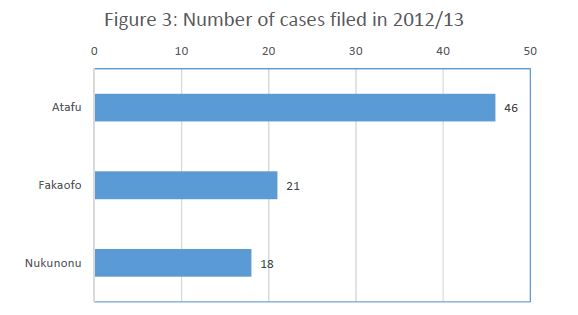
Similarly, the number of accused varies
significantly between the three islands, from 18 accused on Nukunonu to 82
accused on Atafu (Figure 4).
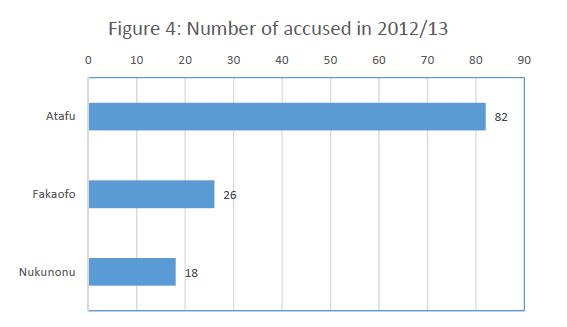
There is a high clearance rate across the
three islands (Figure 5).
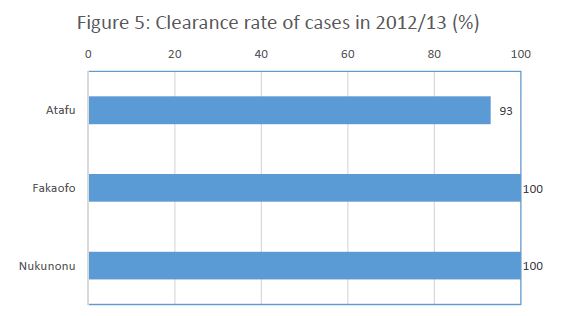
The Law Commissioner on Atafu hears the
highest number of cases, and the average duration of a case heard in Atafu is
the lowest at 24 days. The reverse is true in Nukunonu, where the Law
Commissioner heard 18 cases in 2012/13 with the average duration of these cases
being153 days (Figure 6).
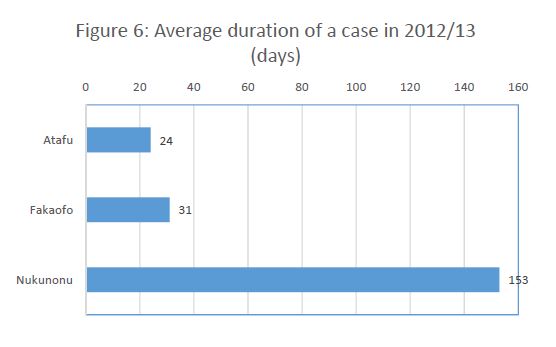
The most common types of cases are:
- Assault
- Bodily harm
- Fighting in public
- Intoxicating liquor
- Offensive behaviour
- Theft
- Trespass.
There was a 97 percent clearance rate for
all cases brought before the three Law Commissioners in Tokelau during 2012/13.
4.1.1
Atafu
During 2012/13, 46 cases were filed with
the Atafu Court. Of these 46 cases, 43 cases were finalised – this is a 94
percent clearance rate for cases filed in Atafu. This compares to a 100 percent
clearance rate for cases filed in 2011/12 (Figure 7A).
The average duration of a case in Atafu
during 2012/13 is 24 days from filing with the Court Clerk to finalisation. The
judicial officers in Atafu have halved the time it takes to hear a case from 50
days in 2011/2012, to 24 days in 2012/2013 while the number of cases has stayed
the same (Figure 7B).
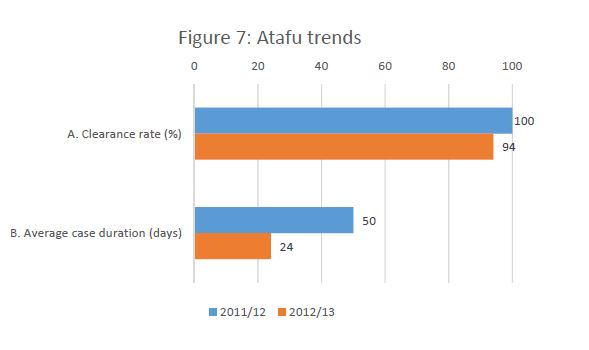
Of the 46 cases filed in the Atafu Court
during 2012/13:
- 77% were finalised within 30 days of
filing at the court house
- 19% were finalised between 31 and 90 days
- 2% were finalised between 91 and 180 days
- 2% were finalised over 180 days.
This is further illustrated in Figure 8.
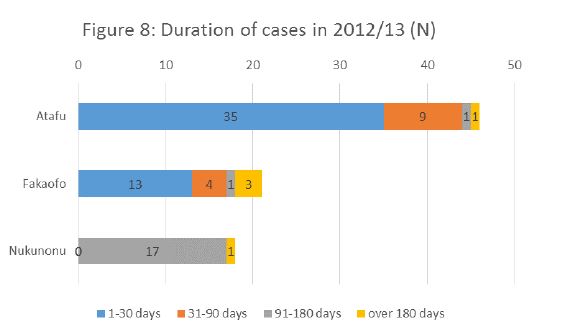
The gender breakdown of the accused in the
46 Atafu cases is 16 percent female and 84 percent male (Figure 9, top).
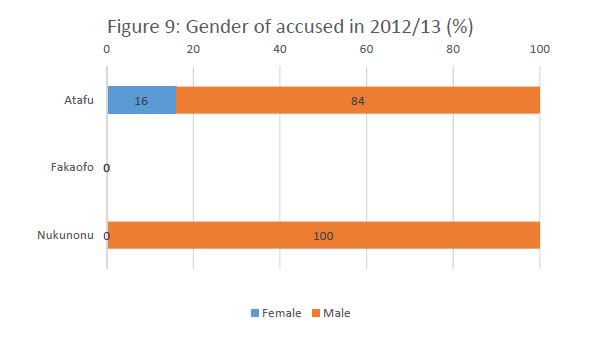
About 33 percent of the accused in the 46
Atafu cases are under the age of 18 (Figure 10, top). In 100 percent of the 46
Atafu cases, the accused pleaded guilty.
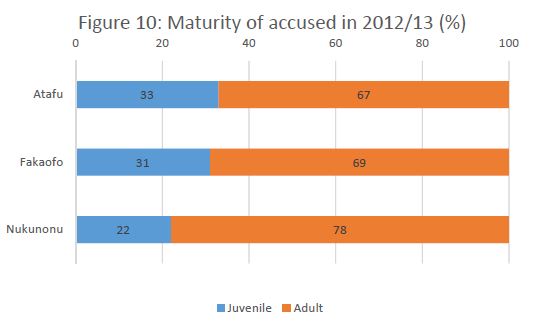
4.1.2 Fakaofo
The average duration of a case in Fakaofo
is 31 days from filing with the Court Clerk to finalisation. The average
duration of a case in Fakaofo rose from 16 days in 2011/12 to 31 days in
2012/13 (Figure 6, middle).
Of the accused in the Fakaofo cases, 31
percent are under the age of 18 (Figure 10, middle).
4.1.3 Nukunonu
Of the 18 cases filed in the Nukunonu Court
during 2012/13, 94 percent were finalised between 91 and 180 days of filing at
the court house. The average duration of a case in Nukunonu is 153 days from
filing with the Court Clerk to finalisation, up from 66 days in 2011/12 (Figure
6, bottom).
The gender breakdown of the accused in the
18 Nukunonu cases is 100 percent male (Figure 9, bottom).
Of the accused in the 18 Nukunonu cases, 22
percent are under the age of 18 (Figure 10, bottom).
4.2
Police Results 2012/13
This report accounts for the achievements
by Police across the three villages. The Police are extremely pleased with
their overall achievements in this reporting period. The standard of services
provided by the Police is the same across all the villages.
- Highlights in the Police performance are:
- Assist anyone who needs assistance
- Community awareness workshops: being
proactive
- Enforcing general rules (village rules and
Tokelau Government law)
- Escorting students to and from school
- Involvement and organising sports and
activities, youth and sport groups
- Patrolling: boat patrol, mobile patrol,
village curfew
- Protect life and property
- Provide security and support to the
Taupulega, General Fono, and community meetings
- Quarantine
- Taking part in local projects, e.g.
seawall, solar projects
- Training.
The vision of the Police is that the
Tokelau people will live in a peaceful and a safe community.
4.2.1
Atafu
Police achievements in the reporting
period: We have seen that the department is progressing. Not at the pace needed
but we are experiencing a lot of good changes with the help of our mentor from
the NZ police force. At the moment we are trying not to depend too much on the
help from outside, but we should create an environment within the force that
strengthens the bonds between the officers and the sergeant (working together
as a team).
4.2.2
Fakaofo
Services provided by the Police:
- Attend to emergencies
- Provide security to the school children on
the school boat
- Provide information and security to all
people/children on impacts of sniffing petrol and drinking homebrew
- Investigate vessels/canoes travelling
between the two atolls of Fakaofo (Fale/Fenuafala)
- Their speed
- Ensure they have torch
Ensure the vessel/canoe travels at the
right speed for safety reasons and especially for those who are bathing in the
sea.
4.3
Police Workload
The Police workload for the three villages
of Tokelau is very similar. The normal day-to-day duties for police officers is
to enforce the law. Hence the Police would handle any complaints lodged to
their office by complainants regarding any breaches of the laws; the Police
patrol the villages at night time - mainly during curfews hours - and attend to
any matter that could disturb and breach the peace and harmony in the villages
and families. The Police do acknowledge that the festive season is the busiest
time, with likely breaking of the law due to abundant consumption of alcohol,
which can lead to other offences being committed.
The three village police forces have
acknowledged the need to have sufficient staff with necessary working tools to
effectively carry out their roles, and ensure peace and harmony is retained in
the villages at all times.
The Police also are tasked to provide
security to the meetings of the Taupulega (Council of Elders) in all the three
villages and carry out any other tasks given to them by the Taupulega. The
security for the meetings of the General Fono (Parliament of Tokelau) is also
provided by the Police. Security is also extended to the Ulu o Tokelau (
Titular Head of Government) when visiting any of the three villages of Tokelau,
and to special guests of the villages and Government of Tokelau.
In one of the villages, the Police are
responsible for the post service. The registration and the issuing of licences
is also a responsibility of the Police in the three villages.
The common crimes committed in the three
villages are:
- Adultery
- Assault
- Bodily harm
- Careless driving
- Careless with fire
- Civil cases
- Disorderly behaviour
- Drunkenness
- Fighting in public
- Fraud
- Homebrew
- Noise
- Sniffing (petrol, glue etc)
- Spreading rumours
- Theft
- Throwing stones
- Trespassing
Underage drinking.
4.4
Courts Human Resources
4.4.1 Atafu
- Law Commissioner Mr Feleti Lopa
- Court Clerk Miss Latu Lopa
- Law Commissioner by default: Person
performing the functions of Faipule.
4.4.2 Fakaofo
- Law Commissioner Mr Penehe Tulafono
- Court Clerk Mr Iona Tinielu
- Law Commissioner by default: Person
performing the functions of Faipule.
4.4.3 Nukunonu
- Law Commissioner Mr Tumua Ioane
- Court Clerk Miss Lepeka Amato-Perez
- Law Commissioner by default: Person
performing the functions of Faipule.
4.4.4 Village Appeal Committees
In each village there are members
previously appointed by each Taupulega for their Village Appeal Committee. Each
has a maximum of three members
4.5
Police Human Resources
4.5.1 Atafu
Sergeant: Mr Reupena Leitu.
Constables:
- Mr Poni Simi
- Mr Amanaki Paulo
- Ms Hegalo Vitale
4.5.2 Fakaofo
Sergeant: Mr Safiti Gaualofa (SG)
Constables:
- Mr Gau Gau (GG)
- Mr Heo Peleni (HP).
- Mr Kovati Gasologa (KG)
- Mr Tavita Gaualofa (TG)
- Mr Tavita Pue (TP)
Currently recruiting a female police
officer.
The current distributions of roles and
responsibilities to the Police can change in the future. The Sergeant is also
involved in all the different services and responsibilities performed by the
different police officers.
All the above officers were trained in the
Police Recruit course in Samoa, except two police officers from Nukunonu. We acknowledge
the presence of Terry Gibbons, he is an important resource to our National
Police Force.
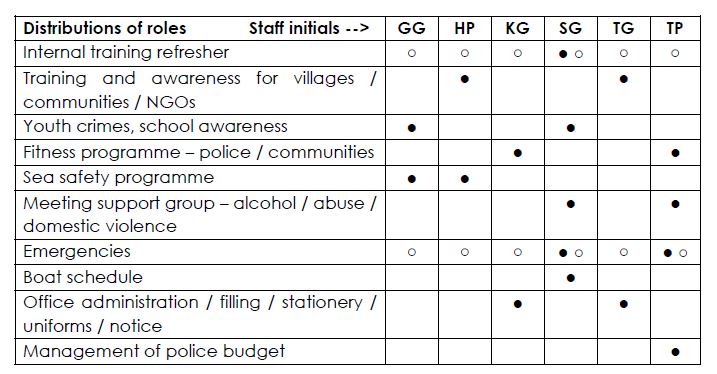
4.5.3 Nukunonu
In 2012/13 there were five police officers
who were all new to the job. The officers still lack the knowledge and skills
in relation to police work, especially in the area of conducting investigations
and preparing police reports and a summary of facts.
Ongoing capacity building is needed for
these officers.
- Training on police reporting and preparing
a summary of facts.
- Training on the prosecution of cases.
Sergeant: Mr Sefo Leo (SL)
Constables
- Mr Aleki Manuele (AM)
- Mr Patrick Tegei Lui (PL)
- Ms Suliana Pehamino (SP)
Police (yet to undergo formal police
training)
- Mr Kueva Aleki (KA)
- Mr Viliamu Ioapo (VI)
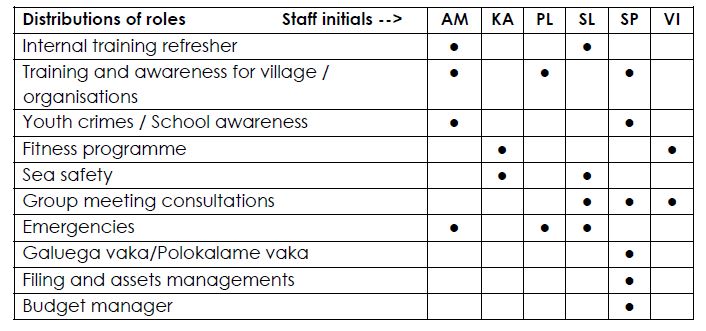
Each police station is now equipped with
some resources to enable the Police to do their work in the office, for
example, laptop computers, printers, stationery, police hand-held radios, and a
boat for travel between the islands (Fakaofo).
5.
Instituting Principles of Good Governance and Enhancing Integrity in the
Institutions of Law and Justice
5.1
Tokelau Public Service Code of Conduct
The Tokelau Public Service Code of Conduct
was endorsed by the General Fono in 2004. It is a set of rules which clearly
defines expected behaviours and standards of integrity from members of the
public service, including members of the police force. The Code of Conduct also
outlines expectations of the employer from the employees as well as the
expectation of the employees from the employer. The employer has the
responsibility to administer the Code of Conduct through ensuring that all
public servants follow and abide by all stipulations in it. Unacceptable and
inappropriate conduct, and failure to meet required standards of performance,
may lead to disciplinary measures. It is a responsibility of all public
servants to read and understand the Code of Conduct.
There are three principles under the
Tokelau Public Service Code of Conduct. Employees shall:
1. fulfil their lawful obligations to the
Tokelau authorities with professionalism and integrity
2. perform their official duties honestly,
faithfully and efficiently, respecting the rights of the public and their
colleagues
3. not bring the Tokelau public services
into disrepute through their private activities.
5.2
Judicial Code of Conduct
The Judicial Code of Conduct provides
guidelines and rules to the Law Commissioners of Tokelau on how they should
carry out their roles; and also for the members of the community to know and
understand the expected behaviours from the Law Commissioners when they carry
out their duties. The common principles in practice are:
(i) Diligence:
The duty of the Judges to serve diligently when they deliver decisions without
any unnecessary delays.
(ii) Integrity:
Judges must conduct themselves with utmost integrity to sustain and enhance
public confidence in the judiciary.
(iii) Equality:
Judges must conduct themselves and proceedings so as to ensure equality
according to the law.
(iv) Judicial
independence: Judges must make their decisions independently.
(v) Impartiality:
It is important for Judges not only to be impartial but also to appear to be
impartial in their decision-making.
(vi) Judicial
demeanour: Judges must maintain firm control in the court room and ensure
people in the Court are treated with courtesy and respect.
(vii) Courtroom
conduct: Important for the Judges to ensure that the people coming to Court
are treated with respect and are being served.
(viii) Communication
in Court: The Judges should communicate clearly so that the people in Court
understand what has been said.
5.3
Complaint-Handling Mechanism for Tokelau Judiciary and Police
At present there is no established
complaint handling mechanism for the Tokelau Judiciary and Police. While the
Police and Judiciary hear that there are people who are not satisfied with
their services, no formal complaints were received.
The Tokelau Judiciaries and Police do value
the voice of our communities especially the opinion of our court users on
whether their judicial needs are being met in a timely manner. As previously
mentioned, the initiatives by our justice agencies to have a complaint box or
other ways to get feedback from court users are now established. One of the
judiciaries reported to have put in place a complaint box; other judiciaries
reported that court users are encouraged to bring themselves to the office to see
the Police, the Law Commissioners or Court Clerks should they have any issues
regarding their judicial needs or with judicial services. These processes are
in their early stages and no doubt will take time to achieve their purpose. A
lot more is required to be carried out by our judicial officers and Police,
especially through community workshops. These could educate our people and
court users on the legal processes available and knowing how to use these to
meet their judicial needs.
5.4
Management Accountability
5.4.1
Annual Accounts for Reporting Period
The three respective judiciaries of
Tokelau, in Fakaofo, Nukunonu and Atafu, are under the management of their
respective Village Councils. The village judiciary accounts are managed under
each village budget in accordance with the approved funding allocations for
judicial services and Police for that particular financial year. In each
village, the Financial Manager oversees village funding for this period in
partnership with the Tokelau Government Department of Finance. This department
has overall responsibility for reporting on village and departmental expenditure
for the financial years to the General Fono. The allocation of funding for each
judiciary from the overall village funding differs, reflecting their approved
budget by the General Fono as well as village development priorities for that
particular period.
5.5
Training and Development Opportunities for Court Staff and Police
Training and development opportunities for
Tokelau judicial officers and Police at both national and regional level are a
significant component of the Tokelau National Strategic Plan. This is to ensure
that the delivery of a quality justice service for the people of Tokelau is
maintained at a high level. The development of human capacity is pivotal and a
priority for the Tokelau judiciary. The Tokelau judiciary is grateful to the
Government of Tokelau, the Taupulega and the Pacific Judicial Development
Programme for ongoing support in the national and regional training of Tokelau
Judicial Officers.
The Government of Tokelau has in the past,
with the Pacific Judicial Development Programme, co-funded national training
mainly for the capacity building of the Law Commissioners, Court Clerks and the
Police. Past training has also included members of the Appeal Committees from
the respective villages.
During the financial year 2012/13, the
Tokelau Police Officers have been fortunate to take part in the Samoa Police
Recruits training. The new police recruits course started in May 2013 and three
police officers from Nukunonu participated in that training. The course was to
run for 3 -4 months, finishing in September.
In February 2013, two Court Clerks
participated in a regional training programme funded by the Pacific Judicial
Programme on Training for Trainers in Auckland.
The availability of regular national and
regional training opportunities for Tokelau judicial officers to enhance their
judicial skills and knowledge is important: it can only contribute to overall
improvements in the delivery of justice for the people of Tokelau.
The Tokelau Police and court judiciary
staff hope for more regional training opportunities. There is also a need to
establish their internal training programme/mechanism so that more regular
training can take place within the police sector and the court for refreshing
skills and knowledge. Having such a mechanism would enable the transfer of
knowledge from those officers who attended regional trainings outside Tokelau,
and pass new information and skills on to their work colleagues.
5.6
Management of Courts and Police Infrastructure
5.6.1
Court Houses
It is important to note that in the three
villages of Tokelau there are no court houses. The court cases are held in the
village meeting house in the village of Atafu and Nukunonu. In the village of
Fakaofo, the court cases are held in the office of the Law Commissioner. Prior
to holding court cases the Court Clerks must ensure the meeting house or office
is ready and clean in preparation.
The Law Commissioners and Court Clerks do
have offices and some are housed in the same office with other public services.
In the village of Fakaofo and Nukunonu the judicial officers do have their own
space although office is also shared with others.
5.6.2
Police Offices
In all the three villages of Tokelau, the
police officers have their office space in the same building which is shared by
all village employees. The police officers are responsible for the management
of their office and any other infrastructure which belongs to them.
There are no holding cells at present at
any of the police stations. The Police would like to have some cells built for
security purposes especially for drunken people who need supervision overnight
until when the person has settled.
5.7 Improving National Border Management
The Police in the three villages exercise
some border management responsibilities, mainly in relation to checking the
luggage of incoming passengers within atolls but also from outside Tokelau. The
Police have identified the need to establish a border management mechanism
within their respective villages, and within the 12 miles territorial waters of
Tokelau.
- Yacht boarding
- Territorial waters
- EEZ (future achievement).
Needed are:
- good facilities and ongoing training to
guard the border and coastline
- good tools and resources to enable the
Police to carry out their functions effectively
- support of the leaders of each village to
enable the Police to conduct this
- work effectively and efficiently for the
betterment of Tokelau.
Appendix:
Summary of Expenditure for Police & Judiciary for the Period 01 July 2012
to 30 June 2013 (NZ$)
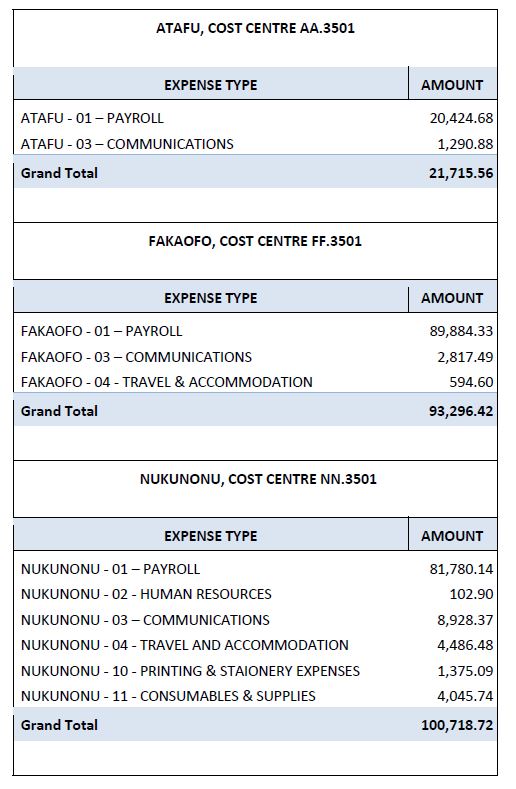
PacLII:
Copyright Policy
| Disclaimers
| Privacy Policy
| Feedback|
Report an error
URL: http://www.paclii.org/tk/court-annual-reports/2012-2013.html













